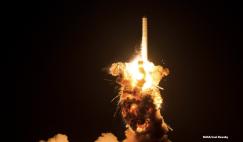In the midst of an era when space tourism finally seems about to ‘take off’, and billionaire CEOs are vying for space bragging rights, this book provides a timely summary of what it takes to develop a space tourism company. It tells the story of Virgin Galactic’s 17-year struggle to bring a spaceship into service and render Richard Branson’s dreams of space tourism a reality.
According to the book’s blurb, the author “knows Virgin Galactic intimately [having] spent nearly four years embedded with the company at its hangar in the Mojave Desert”. In a note, the author himself confirms that he made 16 trips to Mojave and conducted hundreds of taped interviews, assuring us that “Everything in these pages happened; everything between quotation marks was said”. Apparently, he was “around so much that a new hire once confused [him] for an employee”. However, once his piece was published in the New Yorker, in August 2018, his “embedded status was revoked” and employees were told not to talk to him. I think we can draw our own conclusions.
As the book’s title suggests, it is ultimately a celebration of the test pilots whose day-to-day work involves putting their lives on the line. In some ways, it is a modern reimagining of Tom Wolfe’s enduring classic ‘The Right Stuff’. The Prologue immediately immerses the reader into the gut-wrenching spin experienced by Mark Stucky in one of the early tests of SpaceShipTwo, but the story becomes especially voyeuristic when Stucky asks the author if he wants to see the cockpit video. Stucky’s wife, who hasn’t seen it, comes into the room midway through, “swallowing tears”. As the author writes, “They didn’t discuss the dangers of his job much”.
As with many such books, there is also an autobiographical element: the author’s father was a distinguished combat pilot and his parenting philosophy involved a number of “rites of passage”. The author admits that it took him more than a decade to realise that he “never really wanted to become a pilot so much as I wanted to become like my dad, to achieve what others deemed impossible”. It was having sons of his own that prompted the “revelation” and helped him to better understand his father.
The book is divided into three parts, entitled Brothers, Fathers and Sons, with a total of 32 chapters. The main text is followed by chapter notes, a bibliography and a decent index. It is illustrated throughout with black-and-white photos, but the reproduction is decidedly ‘average’ due to the publisher’s choice of paper stock.
It is the words that matter, however, and this is a well-written narrative. Informed readers are bound to gravitate towards the description of the infamous ‘pilot error’, in 2014, that destroyed the first SpaceShipTwo when the wing feathering mechanism was released at the wrong time. Schmidle writes: “When Branson read the message from Whitesides he knew what it meant even before he knew what it meant”; the message was “Bad Day”. In the final analysis, it delayed the materialisation of Branson’s dream by more than five years.











